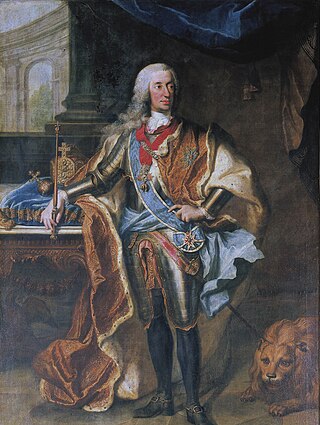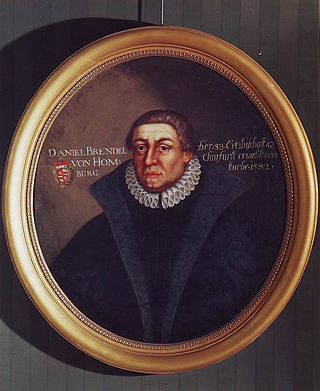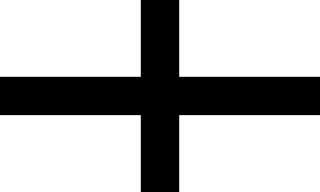Related Research Articles

The Holy Roman Empire, also known as the Holy Roman Empire of the German Nation after 1512, was a polity in Central and Western Europe, usually headed by the Holy Roman Emperor. It developed in the Early Middle Ages and lasted for almost a thousand years until its dissolution in 1806 during the Napoleonic Wars.

Charles VII was Prince-Elector of Bavaria from 26 February 1726 and Holy Roman Emperor from 24 January 1742 to his death. He was also King of Bohemia from 1741 to 1743. Charles was a member of the House of Wittelsbach, and his reign as Holy Roman Emperor thus marked the end of three centuries of uninterrupted Habsburg imperial rule, although he was related to the Habsburgs by both blood and marriage.

Frankfurt Cathedral, officially Imperial Dome of Saint Bartholomew, is a Roman Catholic Gothic church located in the heart of Frankfurt am Main, Germany. It is dedicated to Saint Bartholomew.

The Holy Roman Emperor received the imperial regalia from the hands of the Pope, symbolizing both the pope's right to crown Christian sovereigns and also the emperor's role as protector of the Catholic Church. The Holy Roman empresses were crowned as well.

Daniel Brendel of Homburg was the Archbishop-Elector of Mainz from 1555 to 1582.

The Free Imperial City of Aachen, also known in English by its French name of Aix-la-Chapelle and today known simply as Aachen, was a Free Imperial City and spa of the Holy Roman Empire west of Cologne and southeast of the Low Countries, in the Lower Rhenish–Westphalian Circle. The pilgrimages, the Coronation of the Holy Roman Emperor, flourishing industries and the privileges conferred by various emperors made it one of the most prosperous market towns of the Holy Roman Empire.
The imperial election of 1376 was an imperial election held to select the emperor of the Holy Roman Empire. It took place in Frankfurt on 10 June.
The imperial election of 22 May 1400 was an imperial election held to select the emperor of the Holy Roman Empire. It took place in Frankfurt.
The imperial election of 1438 was an imperial election held to select the emperor of the Holy Roman Empire. It took place in Frankfurt on March 18.
The imperial election of 1486 was an imperial election held to select the emperor of the Holy Roman Empire. It took place in Frankfurt on February 16.
An imperial election was held in Cologne on 5 January 1531 to select the King of the Romans of the Holy Roman Empire. As the current emperor, Charles V, had not yet died nor abdicated, this election was conducted so as to determine his successor.
An imperial election was held in Frankfurt on 28 November 1562 to select the emperor of the Holy Roman Empire.

The imperial election of 1612 was an imperial election held to select the emperor of the Holy Roman Empire. It took place in Frankfurt on 13 June.
The imperial election of 1619 was an imperial election held to select the emperor of the Holy Roman Empire. It took place in Frankfurt on August 28.
The imperial election of 1658 was an imperial election held to select the emperor of the Holy Roman Empire. It took place in Frankfurt on July 18.

The imperial election of 1742 was an imperial election held to select the emperor of the Holy Roman Empire. It took place in Frankfurt on January 24. The result was the election of Charles Albert of Bavaria, the first non-Habsburg emperor in three hundred years.
The imperial election of 1745 was an imperial election held to select the emperor of the Holy Roman Empire. It took place in Frankfurt on September 13.
The imperial election of 1764 was an imperial election held to select the emperor of the Holy Roman Empire. It took place in Frankfurt on 27 March.

The imperial election of 1273 was an imperial election held to select the emperor of the Holy Roman Empire. It took place in Frankfurt on October 1.

The imperial election of 19 October 1314 was an imperial election held to select the emperor of the Holy Roman Empire. It took place in Sachsenhausen, near Frankfurt.
References
- ↑ Nagel Travel Guide Series: Germany. McGraw-Hill. 1965.
- ↑ Karl Baedeker (Firm) (1960). Frankfurt and the Taunus: handbook for travellers. K. Baedeker.
- ↑ Colin Morris (1991). The Papal Monarchy: The Western Church from 1050 to 1250. Clarendon Press. pp. 424–. ISBN 978-0-19-826925-0.